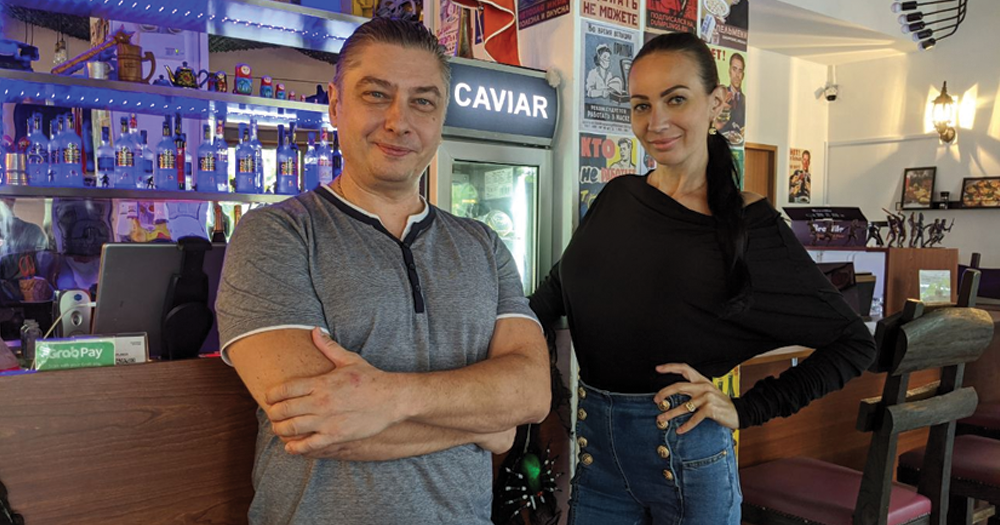PERSPECTIVE: Vadim Zoubovski and Alena Zubovska, who are from Russia, have been in Singapore for the past 16 years. They run a restaurant, Dumplings.ru, at Tanjong Pagar selling Russian and Ukrainian cuisine.
We find out what it's like living in Singapore from their perspective, and why they decided to sell Russian food in a place where the cuisine is relatively unknown.
I was mindlessly watching Instagram stories when I came across an ad to order Russian dumplings.
Wait a minute, Russian dumplings in Singapore???
Given that the Russian community in Singapore is fairly small (apparently 4,500 as of 2018, according to this South China Morning Post article), and Russian food is rather uncommon in Singapore, I was curious to find out more about the people running the restaurant.
I shoot a (politely-worded and not at all crazed) email to the restaurant telling them that I went to Russia a few years back, and that I was really excited to know that I would finally be able to taste Russian dumplings without travelling 8,000km.
Another email and several WhatsApp messages later, I find myself sitting in Dumplings.ru, a Russian restaurant in Maxwell Chambers owned by a husband and wife team.
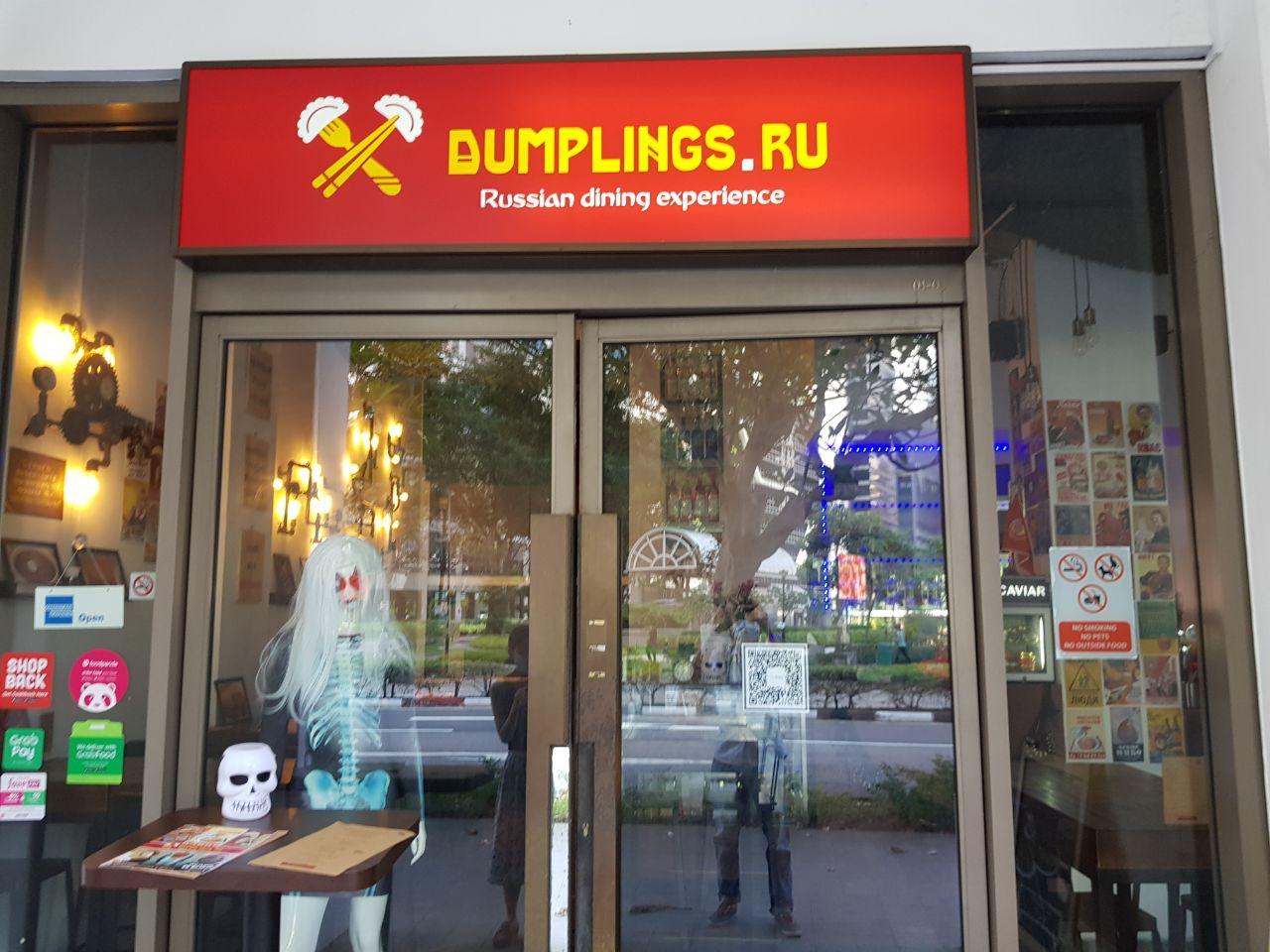 As Halloween is approaching, we were greeted by a heavy-metal-loving skeleton, staring ominously at curious passers-by from the inside. Photo by Matthias Ang.
As Halloween is approaching, we were greeted by a heavy-metal-loving skeleton, staring ominously at curious passers-by from the inside. Photo by Matthias Ang.
On the inside, the restaurant has a homey vintage aesthetic, complete with wooden furniture, warm lighting and vintage posters with Cyrillic script plastered on the walls.
The restaurant, which claims to offer a "Russian dining experience", also has Russian music constantly playing in the background.
(I have to confess that spending two hours in this restaurant sparked my interest in searching for Russian music on Spotify. I have since discovered an actual playlist called "Russian post-punk and sovietwave".)
 Posters I cannot understand. Photo by Tanya Ong.
Posters I cannot understand. Photo by Tanya Ong.
Rows and rows of Russian Standard vodka (they infuse their own vodkas here, including chilli vodka) are lined up at the bar, along with other alcohol.
 Good times. Photo by Matthias Ang.
Good times. Photo by Matthias Ang.
The chiller also holds a dizzying array of drinks imported from Russia, including juices with unique flavours, such as pear and banana juice or birch juice, both of which are highly uncommon in Singapore.
Vadim Zoubovski serves us Kvass (a traditional fermented beverage made from rye bread) and kompot (what he describes as "Russian fruit punch" made with blackcurrant and other fruits like cherries or strawberry) as we sit down to chat.
So this is Vadim.
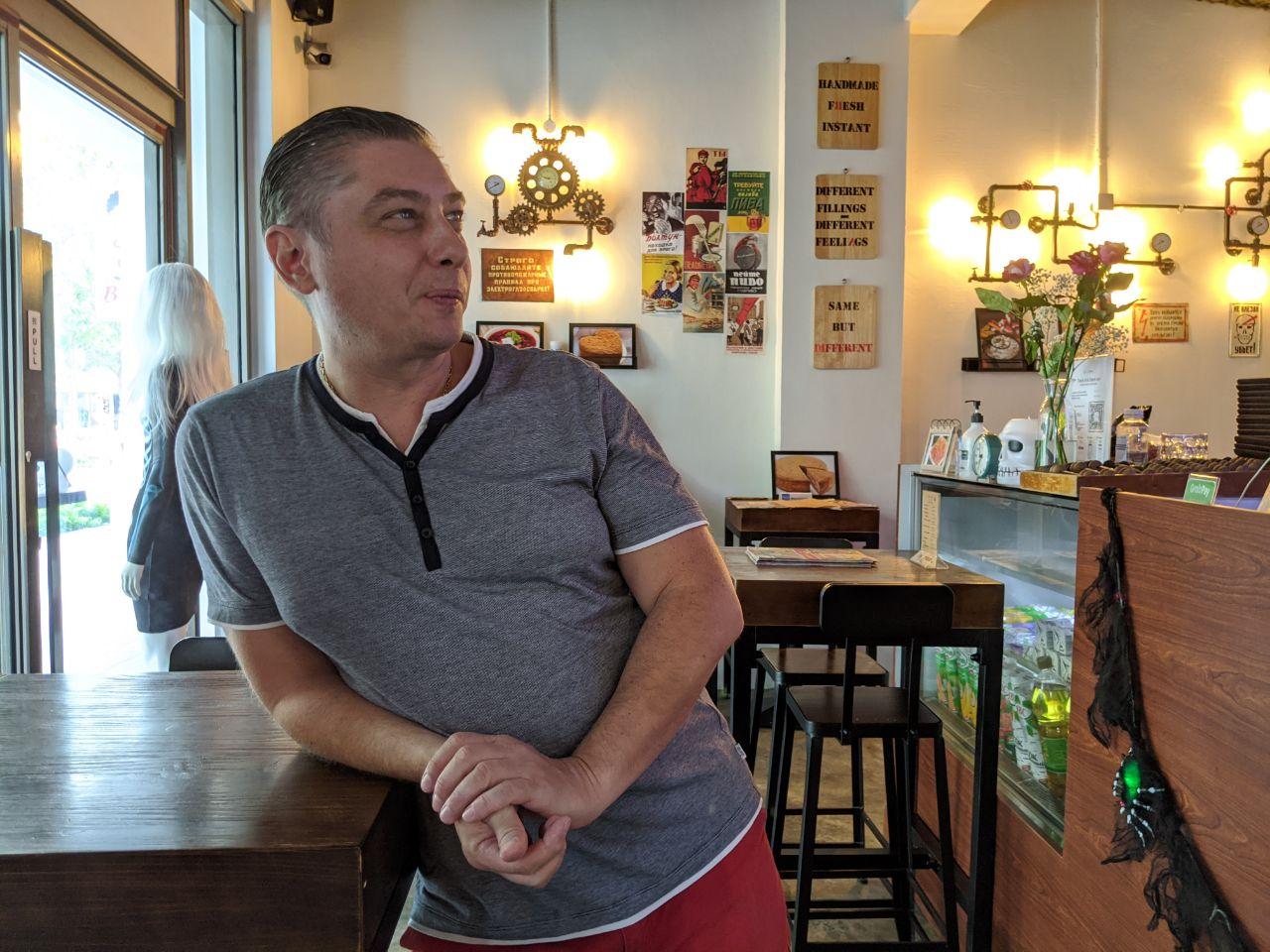 Vadim, with heavy metal skeleton friend lurking in the background. Photo by Tanya Ong.
Vadim, with heavy metal skeleton friend lurking in the background. Photo by Tanya Ong.
Vadim, who was born in Ukraine but currently holds a Russian passport, tells us that he moved to Singapore in 2004 with his family because of a job posting.
And somehow, they stayed for 16 years.
Today, he and his wife, Alena Zubovska, are now Permanent Residents (PRs). They also have two children, a 13-year-old daughter and 19-year-old son, who grew up here.
Food for people who miss Russian cuisine
Alena first started making food and special orders for friends who missed eating Russian food, he says.
They eventually started a food business, a takeaway kiosk near Tanjong Pagar MRT in 2019, so more people, not just friends and friends-of-friends, could try their food.
Fast forward to January 2020, and they have opened a restaurant in Maxwell Chambers.
Going into the F&B business always entails risk, though. Especially when it comes to selling a cuisine that is relatively unknown to locals.
"It's [a] tricky situation, you wouldn't know whether it would go well. When you [cook] at home, you have minimum risk. Once you expose yourself... It's a lot of investments. Secondly, where its one thing when people try your food for free, and say oh it's nice. Whether they will buy it, is a different story."
"People cannot travel so they travel to try new food"
Curiosity gets the better of me and I ask: How have Singaporeans responded to Russian cuisine? What are the popular items?
Dumplings, of course, are hot favourites. The mixed dumpling platter, borsch, and salted red herring salad have also been popular, he tells me.
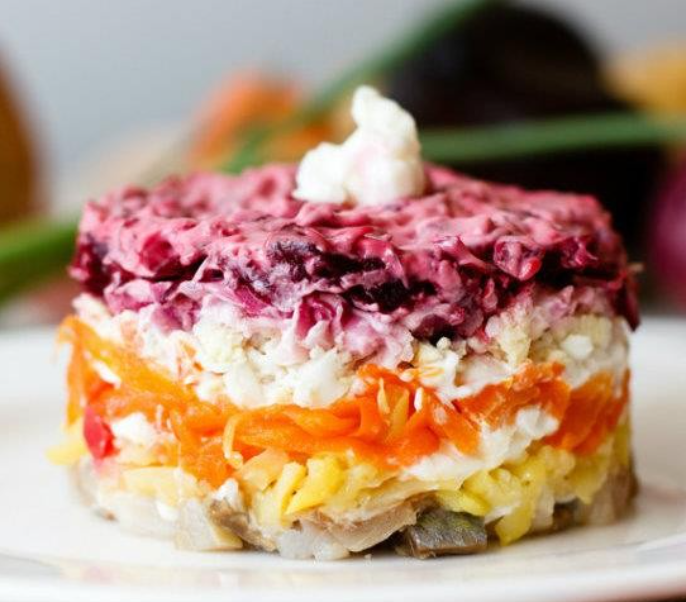 Salted red herring salad, which I understand feeds not only their customers but also their Instagram feeds. Via Dumplings.ru/Instagram
Salted red herring salad, which I understand feeds not only their customers but also their Instagram feeds. Via Dumplings.ru/Instagram
"Nowadays people cannot travel. So they travel to try new food. That is what they do now!"
But as with most things in life, you can't please everybody.
For instance, their restaurant serves cold soup, a popular dish in Russia during the summer, but this has gotten mixed reviews. "What we noticed is 50-50. Either people like it and they eat it, or they do one spoon and they don't like at all."
As Vadim introduces their menu to us, he also explains that there is a page for the "main dishes", which includes a selection of stews and rice dishes.
"For us, dumplings is [a] main! You eat 20 dumplings, you full. But apparently, you guys consider it as a starter. Then after dumplings, you ask 'Oh, what is [the] main dish?'"
As someone who can have dumplings (and only dumplings) for lunch, I cannot relate. But I kind of understand what he means, seeing as how some prefer it as an accompanying dish.
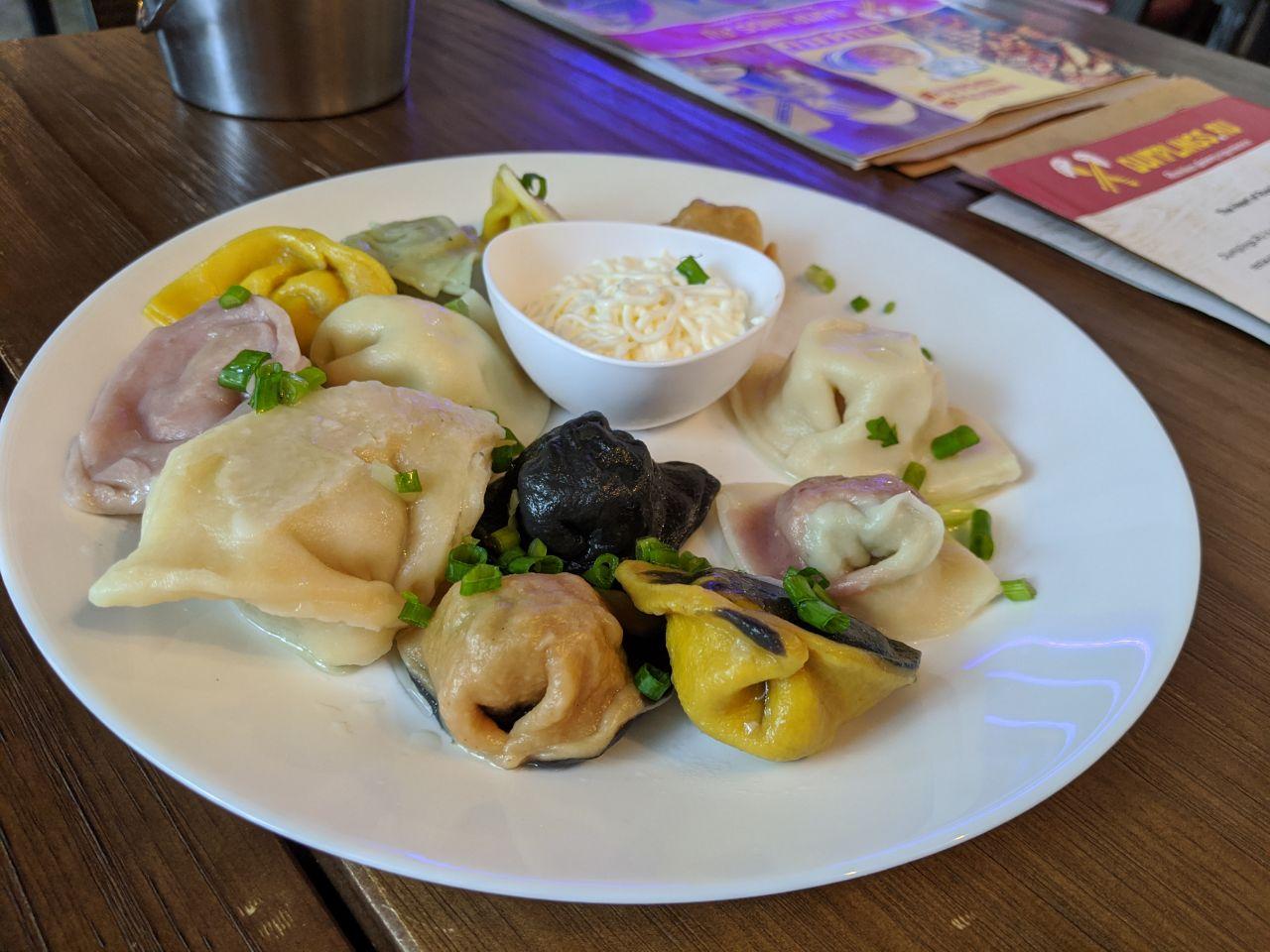 I personally really enjoyed the chicken and salmon dumplings. Photo by Tanya Ong.
I personally really enjoyed the chicken and salmon dumplings. Photo by Tanya Ong.
Despite saying that no, they really don't have to, Vadim and Alena both insist we try some of their food, and bring out borsch and dumplings for us to try.
Twenty minutes later, my colleague and I have polished off 12 dumplings and two bowls of soup between us.
Russian dumplings, compared to jiaozi or gyozas, are chewier and more doughy (which I don't mind because I love carbs). They are also usually eaten with a generous dollop of sour cream, although vinegar is also an option.
Given that the restaurant serves up "authentic Russian food" and drinks commonly found in Russia but not in Singapore, I notice something that looks seemingly out of place: A bottle of Tabasco sauce.
"That's not from Russia!" I point out. And Vadim agrees.
"Some people here like it really spicy, so we have it here (in our restaurant)."
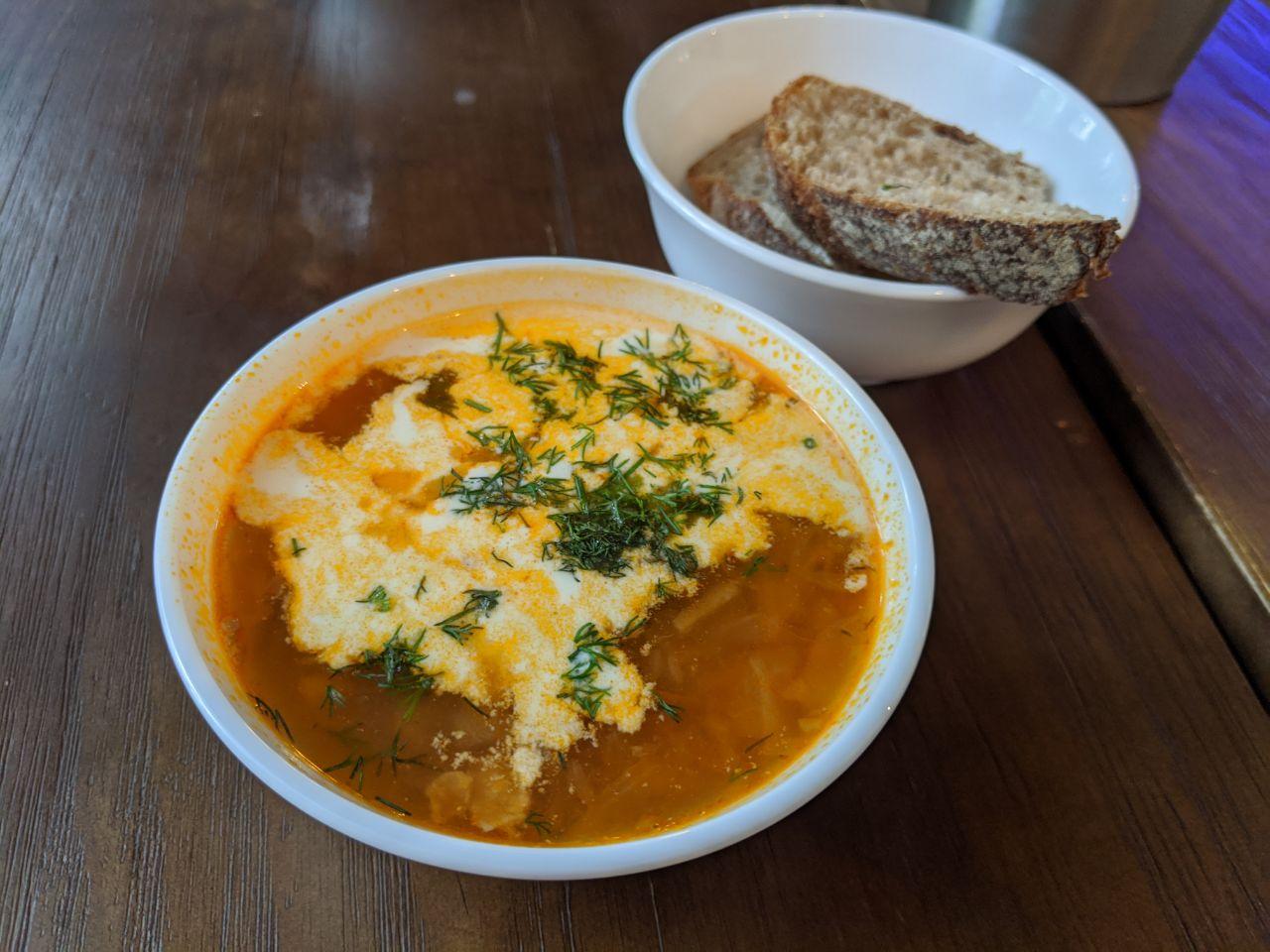 This is borsch. It is not cold soup. Photo by Tanya Ong.
This is borsch. It is not cold soup. Photo by Tanya Ong.
Eating out in Singapore
As we chat, I also discover some interesting observations that Vadim and Alena have on Singapore life.
Like how, in Singapore, takeaway is easily available and people don't think twice about dining out because affordable options are ubiquitous.
In Russia, however, they're really big on home-cooked food, Vadim tells me. There is even a whole culture surrounding making dumplings together with your family during special occasions.
"[Growing up], we used to eat homemade food. Even though our parents were working all the time they still find that the time to cook... [Now] we still try to keep the standard like, okay, you must have hot soup once a day at least, and there must always be homemade food in the fridge."
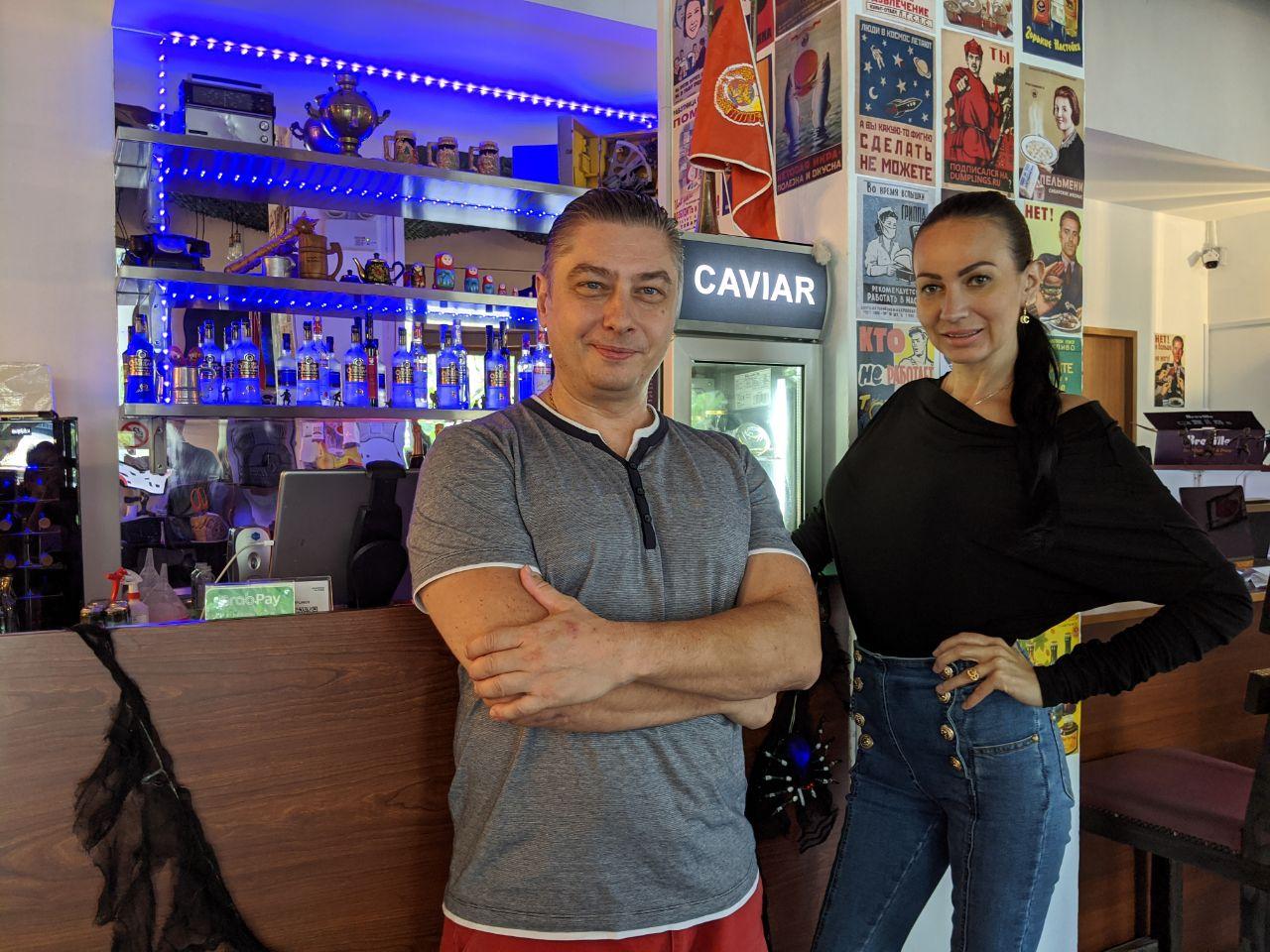 Photo by Tanya Ong.
Photo by Tanya Ong.
After 16 years, things have changed slightly for them, Vadim confesses, and they have come around the idea of eating out more often.
Vadim, who says he enjoys a good roti prata, tells us that his family enjoys eating Chinese food -- particularly shrimp fried rice -- at Din Tai Fung. Which also serves dumplings, I point out.
"Possibly our competitors!" he jokes, before saying that it's "different" from Russian dumplings.
But the one thing he can't seem to wrap his head around, though? Bubble tea.
"Our kids, they go for bubble tea, which I don’t like personally. But they go and buy once the shops opened after Covid (Circuit Breaker)."
"Can't control them, right?" He says. "When they have their own cash, they have more (choices) also."
High heels and fashion
Alena, however, brings up another completely unexpected observation: How women in Singapore don't tend to dress up nor wear high heels very often, apart from special occasions.
I self-consciously glance at my boat shoes (which are clearly not heels), and immediately notice that Alena's wedges are at least four inches high.
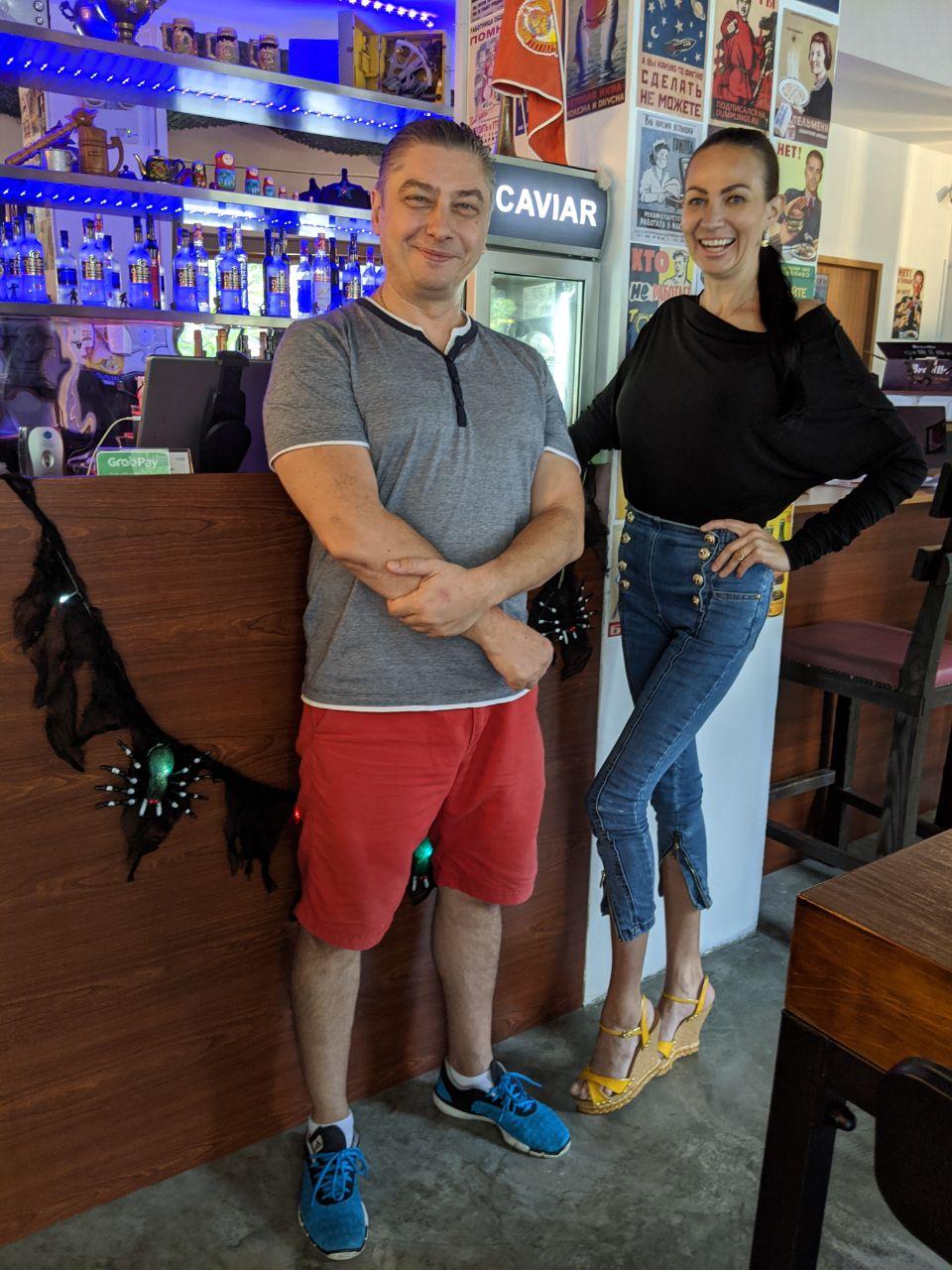 At 1.54m tall, I am even shorter when I stand next to Alena. Sad. Photo by Tanya Ong.
At 1.54m tall, I am even shorter when I stand next to Alena. Sad. Photo by Tanya Ong.
She turns to me and starts apologising profusely, before explaining:
"In Russia, the girls always wear high heels. Always, always! Here, it’s like more casual style -- slippers, shorts, t-shirts. When [I] first came, I was wearing high heels, make-up, always nicely dressed, like a model on the street. Here, you may go some fancy restaurant or disco and then you may meet such a girl. But in Russia, it's normal."
I wish I could have Alena's confidence, but to prevent falling flat on my face, I make a mental note to stick to flat-soled shoes.
Running a restaurant on top of his full-time job
I learn that Vadim's office is located at AXA Tower, so he used to pop in during lunchtime and after work hours. His wife, who was previously a homemaker, currently does this full-time.
How do they run a restaurant if he has to be at work most of the time, I ask?
Most of their food (dumplings, salads, desserts and stews) are prepared in advance, Vadim explains, so there is minimal cooking involved.
The kitchen staff would then either help to assemble the pre-made dishes (like soups, stews or salads) or to cook and serve some of the other dishes (crepes or dumplings).
Now, due to the work-from-home situation, Vadim says he can work remotely from the restaurant, which is fortunate since this allows him to help out more.
"You mustn't be getting much sleep," I say, "since you have to run a restaurant on top of your job."
"Sleeping time is very limited," he tells me, adding that they only reach home at around midnight or later when they are done with the food preparations. They also haven't had a single day off this year.
Despite everything, he tells me that doing this is "fun" because it's something he enjoys, and besides, he gets to interact with people while doing so.
And does he intend to keep staying on in Singapore, possibly even making dumplings?
"Another 16 years? Yeah! We don't have plans to move anywhere because our kids are growing up here. Our daughter was born here... Most of our life we live in Singapore. For our kids is like first home, for us is second home."
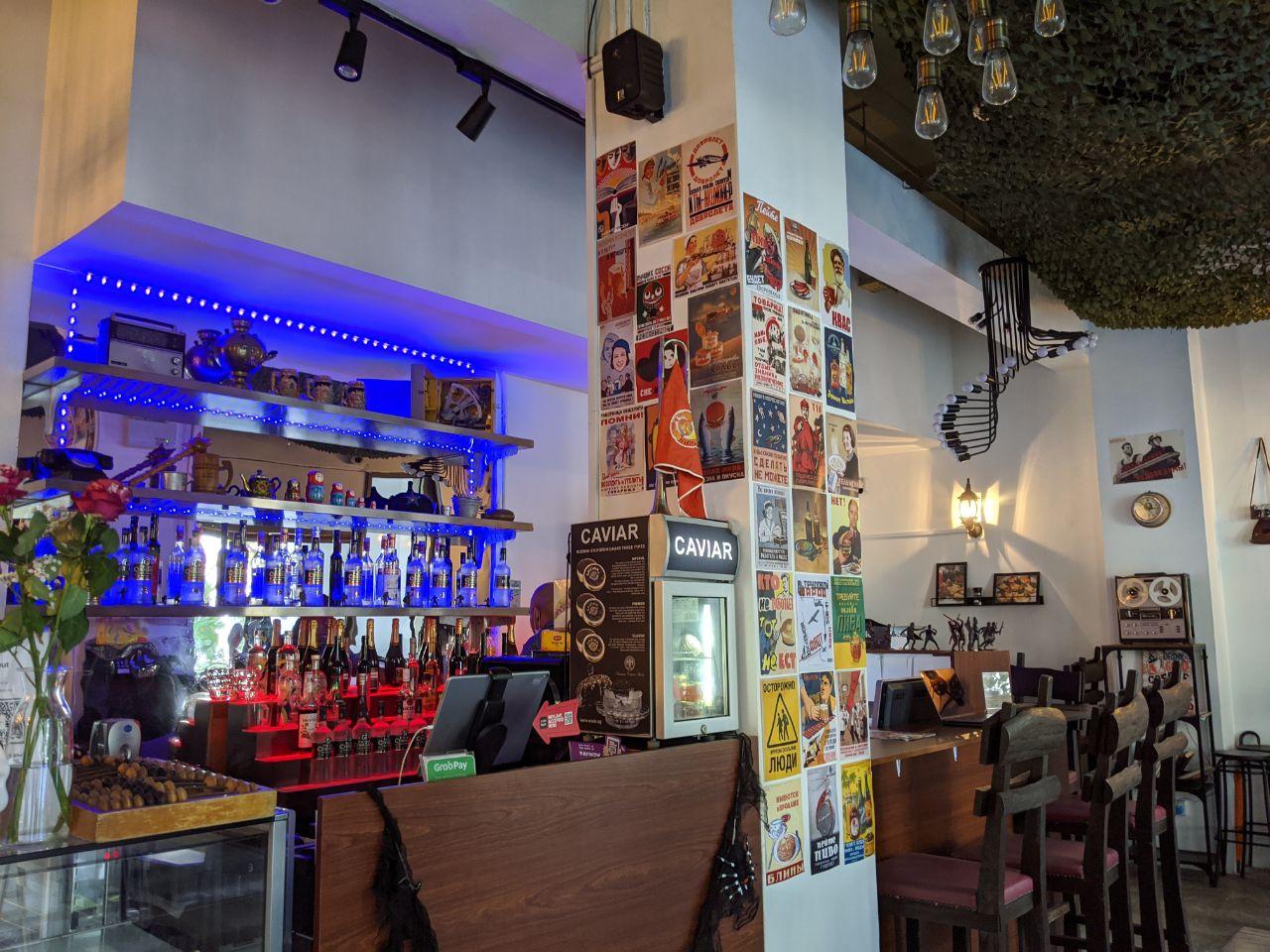 Photo by Tanya Ong.
Photo by Tanya Ong.
Right before we leave, Vadim casually mentions that my name, 'Tanya', is pretty common in Russia.
"Not just Tanya, but also Natasha. Or Ivan (pronounced as ee-varn)," he tells me, "One of the guys who works for us, his name is Ivan."
I jokingly tell Vadim that perhaps he has a penchant for hiring locals with Russian names, and maybe I'd be working for him in the future? (To my editor who's reading this: I'm really joking...)
He laughs good-naturedly and tells me that he hopes to see me again. "Come back when we launch our fried dumplings." And after a brief pause, he adds: "Good with beer."
I shoot him a knowing look, and nod.
Top photo by Tanya Ong and Matthias Ang.
If you like what you read, follow us on Facebook, Instagram, Twitter and Telegram to get the latest updates.
